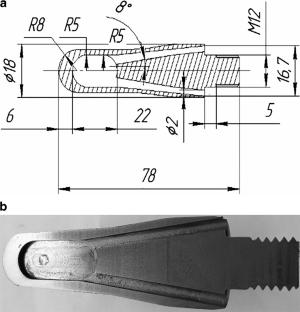Computer and experimental study of the influence of temperature on broaching mandrel quality indices during rolling vessels made of steel 50 in a screw mill 30–80. Part 2
Abstract
Results of an experimental study of temperature distribution along the length of a solid mandrel made of 4Kh5MFS steel in a screw mill 30–80 of Bogorodsky Branch of JSC NPO Pribor during hot rolling of vessels made of steel grade 50 are presented. It is revealed with computer modelling that there is uneven distribution of temperature up to 250 °C along the length of a mandrel from 350 to 600 °C, which leads to crack formation at its surface with a size of about 1.6 mm and a decarburization layer of about 0.8 mm. Regularity of the influence of temperature unevenness along the length of a mandrel on unevenness of hardness distribution from 22 to 50 HRC is established. Results of the study make it possible to develop a mandrel design with the possibility of internal water cooling during broaching vessels in a 30–80 mill. It is shown that use of a water-cooled mandrel made of C0.4Cr5MoVSi steel makes it possible to preserve the original grain structure with a grain size of about 9 points, reduce the decarburization layer by a factor of four, while formation of external defects in the form of cracks is not detected. Based upon calculations of the efficiency carried out at the Bogorodskii Branch of JSC NPO Pribor, it is found that use of a water-cooled mandrel within mill 30–80 will increase its durability by 10% and reduce deviations from permissible geometric dimensions of the cavity of vessels made of steel 50 by 8%.



 求助内容:
求助内容: 应助结果提醒方式:
应助结果提醒方式:


